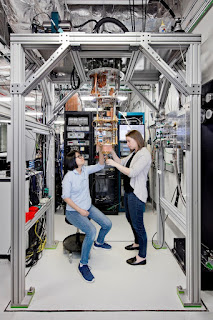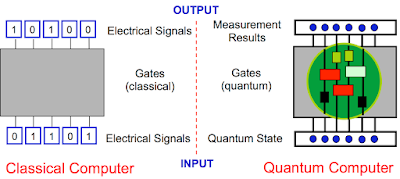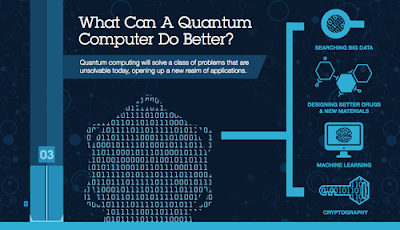Twitter Feed
Convergence: The Catalyst to Transform Scientific Research
by Melvin Greer Greer Institute for Leadership and Innovation A new transformative research approach is gaining global attention and adoption. The scientific opportunities enabled by convergence—the coming together of insights…
Cloud Computing Promises: Fact or Fiction
Cloud computing is currently making information technology headlines, and vendors are aggressively promoting the many benefits it can provide organizations. This White Paper addresses the claims and questions that are…
Super Smart Person’s Guide to Cloud Computing – San Diego
We are offering a fun and educational event just about the cloud. This session will help CEOs, Directors, Managers, and Dilberts learn what the heck the cloud is all about.…
A Managed Services Business Owners Lament: A talk with Joe D.
by Kevin L. Jackson A few days ago I received a call from a small business owner asking if I would meet him for coffee. He wanted to run some…
Technology and the Evolving Workforce
by Melvin Greer Managing Director Greer Institute for Leadership and Innovation According to a Greer Institute Workforce and Talent study, the 2020 workforce is both “the most educated and culturally…
Security attacks and countermeasures
by Sandra K. Johnson Cyber security is rapidly becoming a significant issue in the C-suite as well as the population at large. The results of Dell’s Global Technology Adoption…
ITIL in 7 Minutes!
What is ITIL & how can it benefit your organization? Learn the answers to these questions plus gain an understanding of the ITIL Service Lifecycle in this video. Download a…
How Resilient are FedRAMP Clouds Anyway?
By Jodi Kohut For the uninitiated, FedRAMP is the Federal Risk Authorizationand Management Program, a government-wide program that provides a standardized approach to security assessment, authorization, and continuous monitoring for…
Federal Tech Talk: Cloud Transition Challenges in Government and Industry
Cloud Computing is revolutionizing today’s business marketplace. While “learning the art of the possible”, corporate executives today are struggling with the business and security challenges associate with this important transition. Just…
Cloud, Mobile, Social and Cyber: 2015 Predictions That Will Rock The World (AGAIN!)
2015 PREDICTION TIME!! The worlds of cloud, mobile, social and cyber will continue expanding, permuting and recombining. Their individual effect on society and commerce will become moot as these technological…
- The release of a new API (Application Program Interface) for the IBM Quantum Experience that enables developers and programmers to begin building interfaces between its existing five quantum bit (qubit) cloud-based quantum computer and classical computers, without needing a deep background in quantum physics.
- The release of an upgraded simulator on the IBM Quantum Experience that can model circuits with up to 20 qubits. In the first half of 2017, IBM plans to release a full SDK (Software Development Kit) on the IBM Quantum Experience for users to build simple quantum applications and software programs.
The IBM Quantum Experience enables anyone to connect to IBM’s quantum processor via the IBM Cloud, to run algorithms and experiments, work with the individual quantum bits, and explore tutorials and simulations around what might be possible with quantum computing. Since its launch less than a year ago, about 40,000 users have run over 275,000 experiments on the IBM Quantum Experience. It has become an enablement tool for scientists in over 100 countries and, to date, 15 third-party research papers have been posted to arXiv with five published in leading journals based on experiments run on the Quantum Experience.
 The broad availability of quantum computing capability could prove to be a significant blow to current data encryption practices. In 2015 the US National Security Agency actually advised US agencies and businesses to prepare for a time when the cryptography protecting virtually all e-mail, medical and financial records, and online transactions would be rendered obsolete by quantum computing. The US National Institute for Standards and Technology (NIST) is also running a competition to spur work on post-quantum algorithms.
The broad availability of quantum computing capability could prove to be a significant blow to current data encryption practices. In 2015 the US National Security Agency actually advised US agencies and businesses to prepare for a time when the cryptography protecting virtually all e-mail, medical and financial records, and online transactions would be rendered obsolete by quantum computing. The US National Institute for Standards and Technology (NIST) is also running a competition to spur work on post-quantum algorithms. - Drug and Materials Discovery: Untangling the complexity of molecular and chemical interactions leading to the discovery of new medicines and materials;
- Supply Chain & Logistics: Finding the optimal path across global systems of systems for ultra-efficient logistics and supply chains, such as optimizing fleet operations for deliveries during the holiday season;
- Financial Services: Finding new ways to model financial data and isolating key global risk factors to make better investments;
- Artificial Intelligence: Making facets of artificial intelligence such as machine learning much more powerful when data sets can be too big such as searching images or video; or
- Cloud Security: Making cloud computing more secure by using the laws of quantum physics to enhance private data safety.
This content is being syndicated through multiple channels. The opinions expressed are solely those of the author and do not represent the views of GovCloud Network, GovCloud Network Partners or any other corporation or organization.
( Thank you. If you enjoyed this article, get free updates by email or RSS – © Copyright Kevin L. Jackson 2017)
Cloud Computing
- CPUcoin Expands CPU/GPU Power Sharing with Cudo Ventures Enterprise Network Partnership
- CPUcoin Expands CPU/GPU Power Sharing with Cudo Ventures Enterprise Network Partnership
- Route1 Announces Q2 2019 Financial Results
- CPUcoin Expands CPU/GPU Power Sharing with Cudo Ventures Enterprise Network Partnership
- ChannelAdvisor to Present at the D.A. Davidson 18th Annual Technology Conference
Cybersecurity
- Route1 Announces Q2 2019 Financial Results
- FIRST US BANCSHARES, INC. DECLARES CASH DIVIDEND
- Business Continuity Management Planning Solution Market is Expected to Grow ~ US$ 1.6 Bn by the end of 2029 - PMR
- Atos delivers Quantum-Learning-as-a-Service to Xofia to enable artificial intelligence solutions
- New Ares IoT Botnet discovered on Android OS based Set-Top Boxes




